#Art4Resilience: Announcing the 2022 Knowledge-into-Use award winners
#Art4Resilience: Announcing the 2022 Knowledge-into-Use award winners
In the lead-up to the COP27 Resilience Hub, the Resilience Evidence Coalition launched the Knowledge-into-Use awards to highlight innovative and creative ways of facilitating the use of resilience knowledge. 48 individuals, groups and grassroots organisations submitted ideas in the form of games, cartoons, paintings, drawings, murals, theatre, short films, exhibits of local and Indigenous knowledge and more. The #Art4Resilience Knowledge-into-Use award winners have now been announced.
This post originally appeared on Global Resilience Partnership’s website.
The Resilience Evidence Coalition, a network consisting of the Global Resilience Partnership (GRP), CDKN and the International Centre for Climate Change and Development (ICCCAD) is excited to announce the #Art4Resilience Knowledge-into-Use award winners.
The submissions explored themes of urban, rural and coastal Resilience, and were based on sound evidence published in the form of research papers or reports. Applicants were encouraged to creatively express harmonies between science and elements of justice, equity and Indigenous and local knowledge. The five winning concepts will be awarded $5000 USD to implement or express their idea creatively.
Meet the winners
Áranya Design led by Rhea Shah
Áranya Design is a young women-led rural design, research and advocacy studio based in Western India, working at the intersection of landscape architecture, architecture, art and ecology. They are deeply invested in place, and research traditional socio-hydrological resilience systems, Indigenous wild food and foraging networks, and Indigenous ecological knowledge. They share this knowledge through educational, landscape architecture and public art projects.
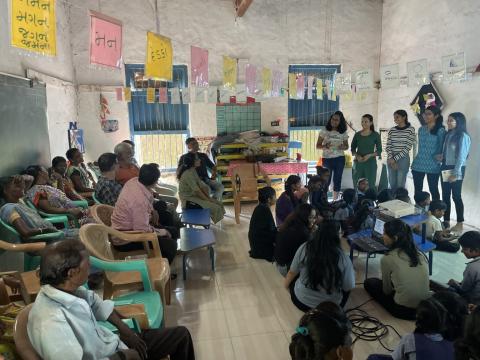
Their Knowledge-into-Use project is an interactive educational zine designed specifically to create engagement with the lake ecosystems. The Zine will document, identify, and classify wild edible and medicinal herbs, and include harvesting methods and recipes from data and information collected from the Indigenous community. It will contain pages for user observations, like calendars on which to mark sprouts / blooms / seeds / populations / locations of annual wild species. Additionally, the zine will include simple experiments to note factors like pollution and organic content and pockets to collect seeds for rewilding. It will also contain activities for children to explore the lake ecosystems.
Joseph Tsongo, Coordinator of the Amani Institute DRC
Joseph Tsongo is a young social change activist based in the Democratic Republic of Congo (DRC). Amani-Institute ASBL is a socio-cultural movement bringing together young volunteers, in particular former child soldiers, working to promote the culture of peace and the development of grassroots communities in the Democratic Republic of Congo.
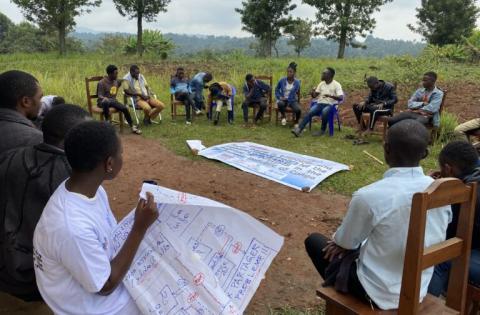
Through the Amani Institute, he has received a Knowledge-into-Use award for his project “adopt a tree, not a weapon.” The project is an advocacy campaign calling on decision-makers to “disarm violence” and “arm climate action” in the perspective of reconciling climate action with peace building in this context of a crisis. The project consists of a series of community radio programs, workshops and forum theatres with a main aim is to facilitate peaceful resolution of conflicts (between farmers and herders, and ethnic communities). The Amani Institute will also raise awareness to and mobilise young people, especially child soldiers, to join the program “disarmament of violence for the armament of climate action”.
Interfer South Africa
Interfer is an arts-based collaborative social enterprise that strives to positively co-disrupt systems of exclusion and hegemony through innovative arts, research, and programmes in collaboration with other professionals, people and artists. Their work is focuses on inclusive/participatory street art and other arts-based methods, participatory workshops, research and programmes with the aim of amplifying voices and transformation.
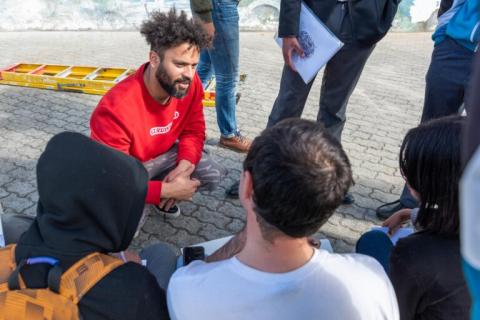
Cape Town’s recent extreme drought (2016 – 2018) was a hard lesson where urban communities’ lives were impacted by the water crises. Inspired to strengthen urban water resilience of the residents, their Knowledge-into-Use project led by Nabeel Peterson will visualise the stories of local community members’ experiences of the challenges and opportunities of securing water services in low-income areas of Cape Town. They will do this through murals painted by local artists at the University of Cape Town. The mural aim to raise awareness of city residents’ vulnerability and resilience, and of new ways of doing research that crosses sectoral boundaries, is engaging and has local impact. Photos and videos produced around the mural will be used as an example of knowledge-into-art to encourage the city to open up more spaces for public art that educates and raises awareness of critical local issues.
Practical Action Peru
Practical Action Peru works on flood resilience in the Rimac watershed to strengthen the capacities of communities to cope with and recover from the hazards to which they are exposed. In order to build safer and more resilient communities, their program works on 3 priority themes: Early Warning Systems, ecosystems and disaster risk reduction, and governance and investments.
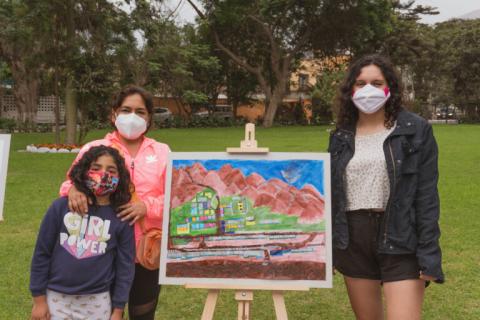
Practical Action Peru received a Knowledge-into-Use award for a publication and exhibition showcasing community art. Seeking to highlight local knowledge on disasters, the program, together with two municipalities of the Rimac basin, organised a community art contest called “The district we want: resilient and safe”. The contest gathered stories and paintings from more than 30 community members, mostly young people and women, who captured the disaster history of their communities. These art pieces were collected in a publication and an exhibition distributed in local libraries and contributed to the analysis of climate hazards and the search for alternatives for disaster risk reduction.
Enock Mwangilwa from the Wildlife and Environmental Conservation of Zambia (WECSZ)
Enock Mwangilwa has been involved in organising and facilitating capacity building training for adolescents and youths in 10 districts in Zambia and leads the Community Coined Climate Actions (CoCCA) project under the Voices for just Climate Action (VCA) programme. WECSZ is an NGO that promotes environmental conservation in Zambia, has implemented a countrywide Environmental Education programme Chongololo and Chipembele Conservation Clubs of Zambia (CCCCZ) that has a reach of over 1,400 Conservation Clubs in Schools.
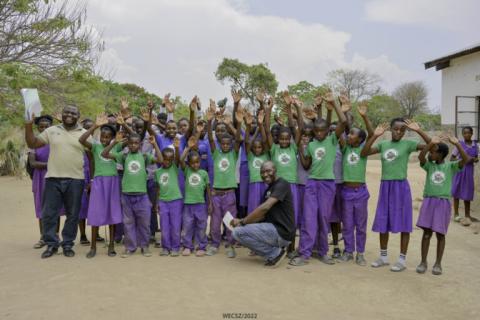
Through the CCCCZ‘s activity dubbed, “Lived a Climate Crisis in Art,” they asked children and teenagers from rural Itezhi-tezhi district in Zambia to express how climate change affects them, the local environmental problems and their perceived solutions in the form of drawings and paintings. Inspired by this art, Enock and his team are committed to bridging the gap between theories and practical implementation targeting school age children and youth. Their Knowledge-into-Use award will be used to establish climate action knowledge and skills hubs, platforms for the community members (especially children, youth and women) to explore smart climate actions in agriculture and forestry. This will further see the transformation of three school production units into climate smart and green zones- spaces for tree nurseries to promote orchards establishment, agroforestry, organic gardening and sustainable soil and water management.
Next steps
Over the next five months, these winners together with their teams will implement their projects and share their progress and their knowledge products in the form of stories on the Resilience platform. Additionally, they will showcase their final art/creative work during GRP’s Evidence Forum in June 2023. To keep up with their stories and progress, join the Resilience Evidence Coalition here.
